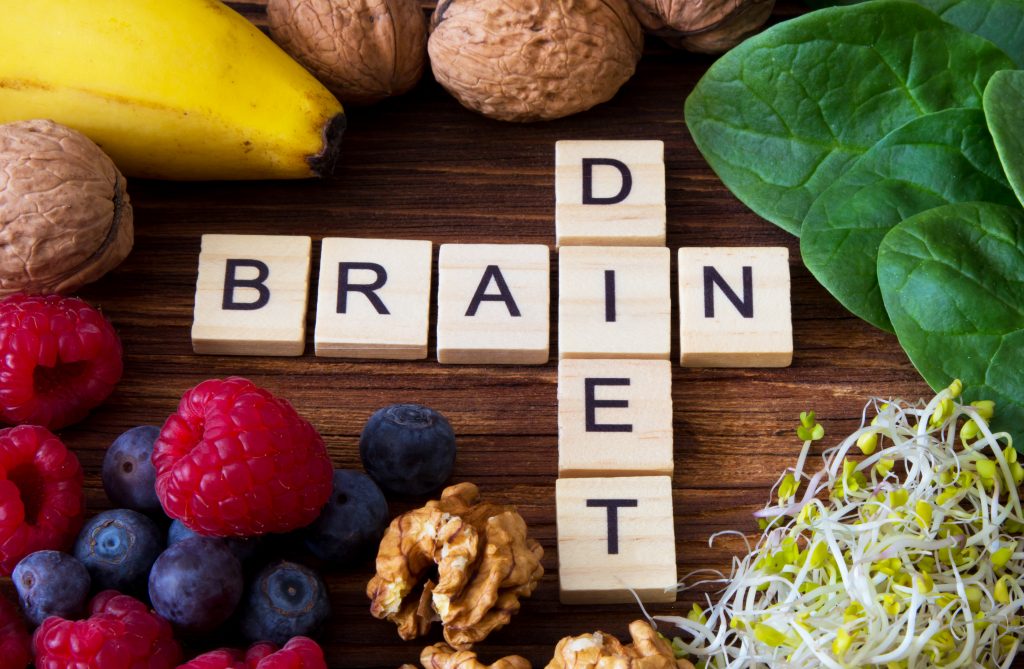When it comes to mental health, the role of food is pivotal. Research has shown, what we eat affects not just our physical health, but also our mental health and wellbeing (1). What we eat and drink affects how we feel, think, and behave.
Comparable to other organs in our body like the heart, stomach and liver, the brain requires different amounts of complex carbohydrates, essential fatty acids, amino acids, vitamins, minerals, and water to remain healthy. To protect and improve our mental health and emotional wellbeing, we should eat a diet that is optimal for brain health. Our brain has a lot of nutrient demands and not getting enough of the right nutrients affects our energy levels, mood and thought processes. Food should be a positive aspect of life offering enjoyment, fuel and happiness for both the mind and body.
The link between diet and mental health
A meta-analysis in 2017 reported the associations between dietary patterns and risk of depression (2). Results showed that those who followed healthy dietary patterns, such as the Mediterranean diet, had a decreased risk of depression. The Mediterranean diet consists of high intakes of fruit, vegetables, wholegrains, oily fish, olive oil, low fat dairy and low intakes of animal foods. This contrasts to the to the typical Western diet which was associated with an increased risk of depression. The Western diet is characterised by a high intake of red and/or processed meats, refined grains, sweets, high fat dairy products with a low intake of fruits and vegetables.
The gut and our brain
Healthy dietary patterns provide a whole host of nutrients which we need to nourish our body. There is emerging evidence suggesting a healthy diet may improve our gut health which could be of benefit to our mental health. Our gut microbiome is home to billions of bacteria which influence the production of neurotransmitters (chemical substances) that constantly carry messages from the gut to the brain i.e. through the gut-brain axis.

Eating a healthy diet promotes the growth of “good” bacteria, which in turn positively affects neurotransmitter production. Our gut microbiome influences brain development, behaviour, and mood. Thus, the calmer and more balanced things are in our gut the more positive mental health outcomes tend to be. Some of the key nutrients that have been shown to have a positive impact on mental health are explained in more detail below.
Antioxidants
A diet rich in fruit and vegetables is also high in antioxidants, for example vitamin C and E. Antioxidants are substances that can protect or slow the damage of potentially dangerous compounds known as free radicals in the body. This leads to less oxidative stress on the body, which may have a protective role against depression. A range of fruit and vegetables (e, g. blueberries, strawberries, spinach, kale, and beetroot) are the best source of antioxidants, but you can also find them in dark chocolate (70% or higher).
B vitamins
Fruit and vegetables are also a good source of B vitamins, including folate. We need folate for brain development and a deficiency has been linked to depressive symptoms (3). This could be due to lower levels of serotonin, our happy hormone. Green vegetables are a great source of folate such as broccoli, cabbage, brussel sprouts, spinach, and kale. Both men and women should aim for 400mcg daily. This is easily obtained by eating a healthy diet containing a wide variety of foods. However, women who could become pregnant, are pregnant or are breastfeeding should take a daily folic acid supplement of 400mcg.
Omega-3’s
High consumption of oily fish is associated with a reduced likelihood of depression (4). This is likely to be due to the high content of omega-3 fatty acids which have anti-inflammatory properties. Sources of oily fish include salmon, sardines, mackerel, and trout. If you do not eat fish, ensure to include omega-3 rich plant-based foods, such as chia seeds or flax seeds in your diet. Aim to eat 1-2 portions of oily fish a week.
Carbohydrates
Carbohydrates are broken down to glucose for energy and 25% of our brain’s energy is fuelled by glucose. When our blood glucose levels rise and fall rapidly, it can make us feel irritable, low, and even trigger symptoms of anxiety. When we do not have enough energy for the brain, we can feel weak and unable to think clearly or focus. Keeping our blood glucose levels steady throughout the day is key and we can achieve this by eating regular meals containing carbohydrates like cereals, bread, rice, grains, and potatoes that release energy slowly. Daily recommended intake is 4-5g per kg of body weight. Aim to have some source of carbohydrates with every meal and remember the further you move your body, the more often you move it and the faster you move it, the more carbohydrates you need!
Protein
Proteins are made up of amino acids and are important building blocks of life. Amino acids help to regulate our thoughts and feelings. We frequently associate protein with building muscles, but proteins are also important for creating many of the natural chemicals in the brain that affect mood and concentration. For example, proteins increase the levels of dopamine in the brain. Dopamine is a chemical messenger that plays a role in attention, motivation, and concentration.
 Data collected by the ART Health Solutions team reported how people’s distractibility can be affected by their home working environment (measured through our “Omics“ Cognition App).The environment in which we work is often out of our control, but what we eat is very much within our control and our food intake can help to alleviate some of the negative effects of these external factors. Having a balanced diet can help maintain focus and concentration throughout our day which is imperative to our productivity.
Data collected by the ART Health Solutions team reported how people’s distractibility can be affected by their home working environment (measured through our “Omics“ Cognition App).The environment in which we work is often out of our control, but what we eat is very much within our control and our food intake can help to alleviate some of the negative effects of these external factors. Having a balanced diet can help maintain focus and concentration throughout our day which is imperative to our productivity.
Being more mindful with our food choices can have a huge effect on our short-term focus and long-term cognitive health. Protein intake affects brain functioning and therefore it is important to get enough protein in our diet. Sources of protein include chicken, beef, eggs, beans, and dairy. The general population should aim to consume 0.8g/kg body weight of protein daily. However, the amount of protein we should aim for depends on our age, goals, and activity. For example, if you are very active you may need double protein portions per meal to support performance.
Foods to have less off
Foods with high levels of saturated fats, refined carbohydrates and processed food products have been linked to poorer mental health outcomes. It is therefore best to keep these to a minimum. That is not to say you should never eat them, just have them in moderation. It is also worth being mindful of caffeine. Caffeine gives many of us an energy boost, but it may also lead to feelings of anxiety and depression in some individuals and affects our sleep.
Gut health – Probiotics
Research investigating the link between our gut health and our mental health has become more transparent. Often referred to as our ‘second brain’, our gut produces over 90% of all serotonin in our body (5). Our gut can also affect immunity and resilience to stress. Having a healthy digestive system, in general, ensures we can absorb the vitamins, minerals and nutrients our brain needs to thrive. Often, when we are feeling stressed or anxious, we will feel it in our gut – that ‘gut-feeling’. Digestion may speed up or slow down, depending on how we are feeling. To keep our gut happy, it is important to ensure we are eating plenty of fibre and getting lots of fluid and regular exercise. Hydration affects our cognitive ability and even when levels begin to drop, we start to feel the consequences through headaches, lethargy, poor concentration, and reduced focus. A practical tip would be to set an alarm to remind yourself to drink 250ml every hour. Additionally, regular movement can have a huge impact on both our physical health and mental well-being, as discussed in this recently published article which provides some practical advice for individuals to help combat the impact of sedentary behaviours whilst working from home.
Probiotics may also play a role into mental health, although this is an area in which more research is needed. Probiotics are live microorganisms which may pass on health benefits to the consumer. It has been suggested that probiotics play a role in the bidirectional communication between the gut and brain. It is thought that there are specific strains which may play a role in the reduction of depression. Fermented foods can give the good bacteria in our gut a boost, so incorporating these into our diet where possible is beneficial. Some examples include kefir, kombucha, raw sauerkraut, raw kimchi and miso.
Take home
There are many factors that contribute to mental health and although good nutritional intake alone may not significantly reduce the overall prevalence rates of mental health problems, our diet plays a contributing role and is something we can control, modify and target in a cost effective and low risk way.
In my last article I explained what we eat directly affects the function of our brain and ultimately our mood which can have a huge impact on the foods we choose to eat. It may seem like a momentous challenge at first, as changing dietary habits is challenging, but remember every healthy choice you make is a step in the right direction. Over time it will get easier and your mental health will thank you for it. Here are some practical take home tips:
- Eat regularly and hydrate often
- Focus on a healthy balanced diet – don’t restrict any food groups
- Compose each of your meals with some carbohydrates, protein, fats, colour (vegetables, fruit) and fluids
- Keep those gut bugs happy by adding some probiotic containing foods such as live yoghurt, kefir, raw sauerkraut, raw kimchi, kombucha and miso into your diet
- Find out what works for you, everyone is different so personalise it to your lifestyle
- Pay attention to how eating different foods makes you feel, not just in the moment, but on an ongoing basis
References
1. https://www.mentalhealth.org.uk/sites/default/files/food-for-thought-mental-health-nutrition-briefing-march-2017.pdf
2. Li, Y., Lv, M.-R., Wei, Y.-J., Sun, L., Zhang, J.-X., Zhang, H.-G., & Li, B. (2017). Dietary patterns and depression risk: A meta-analysis. Psychiatry Research, 253, 373–382.
3. Young S. N. (2007). Folate and depression–a neglected problem. Journal of psychiatry & neuroscience: JPN, 32(2), 80–82.
4. Oddy, W., Hickling, S., et al. (2011). Dietary intake of omega-3 fatty acids and risk of depressive symptoms in adolescents. Depression and Anxiety, 28(7), 582-588
5. Dash, S., Clarke, G., Berk, M., & Jacka, F. N. (2015). The gut microbiome and diet in psychiatry: focus on depression: Focus on depression. Current Opinion in Psychiatry, 28(1), 1–6.

